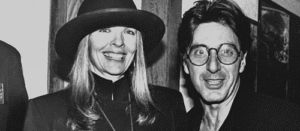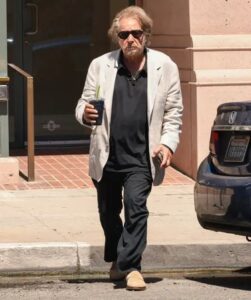Al Pacino Opens Up About His Heartbreaking Regret After Diane Keaton’s Death at 79

Hollywood has lost one of its brightest lights. When Diane Keaton, the beloved actress, director, and fashion icon, passed away at the age of 79, tributes poured in from fans, friends, and colleagues all over the world. Her death marked the end of an era — she wasn’t only a cinematic treasure but also a woman whose wit, eccentric charm, and individuality helped define what it meant to be unapologetically oneself. Yet for one man, her passing hit far deeper than most could ever imagine. For Al Pacino, Keaton’s former partner and longtime friend, the loss has reopened old wounds and rekindled memories of a love that, despite time and distance, never truly faded.
Now 85, Pacino has lived a life filled with critical acclaim, artistic triumphs, and romantic mysteries. But behind the fame and the awards lies a private sorrow — the lingering regret of never having fully committed to the woman he once called “the love of my life.” According to a close friend, the legendary actor has been reflecting on his past with Keaton in the days since her death, quietly mourning not only her loss but also the relationship that slipped through his fingers decades ago.
Their story began in the early 1970s on the set of The Godfather. At the time, both were young, ambitious actors navigating the unpredictable world of Hollywood. What started as professional chemistry between Michael Corleone and Kay Adams soon evolved into a real-life romance. Off-screen, they shared the same wit and artistic spirit — Keaton, with her quirky humor and spontaneous nature; Pacino, with his fiery passion and introspection. Their connection was undeniable, but their differences would eventually become the very thing that tore them apart.
Keaton, ever the romantic, longed for marriage and stability. The loss of her father to brain cancer left her yearning for emotional security and the sense of belonging that family brings. Pacino, meanwhile, was notoriously independent — consumed by his art and wary of commitment. As his fame skyrocketed, so did his restlessness. Despite his deep affection for Keaton, he wasn’t ready to settle down. That divide — between love and fear, freedom and permanence — became impossible to bridge.

In her 2011 memoir Then Again, Keaton wrote honestly about the painful unraveling of their relationship. She revealed that during a therapy session, Pacino confessed that he never intended to marry her. For Keaton, who was still mourning her father’s death, those words struck like a dagger. The relationship ended soon after. Though they lived only a few miles apart in Beverly Hills for many years, they never reconciled. Pacino later told a friend, “There’s no need to talk. We said everything that needed to be said.”
But silence doesn’t always mean peace. For both of them, the emotional bond remained long after the romance had faded. Keaton kept private mementos from their time together — love notes, scribbled messages, and a letter Pacino wrote in 1989 in which he confessed to feeling “uncomfortably lonely” and missing her deeply. Those keepsakes became quiet reminders of a connection that refused to die, even as the years carried them down separate paths.
When Keaton received the American Film Institute’s Life Achievement Award in 2017, the audience was treated to a rare and emotional moment. Pacino took the stage and, in front of a packed theater and millions watching at home, looked at her and simply said, “I love you, forever.” The crowd erupted in applause, but for those who knew their history, it was more than just a friendly tribute — it was a confession decades in the making.
Friends of the two have often said that Keaton never stopped admiring Pacino, even after their breakup. She once described him as “funny, intelligent, and endlessly fascinating,” but admitted he could also be distant, unreachable, and emotionally complicated. “He was the love of that time,” she said, “not the love of my whole life.” Still, there was tenderness in her words — the kind that only exists between two people who once shared something real.
For Pacino, her passing has brought those memories rushing back with painful clarity. According to someone close to the actor, “He’s been talking more about Diane lately than he has in years. He knows he hurt her, and he’ll always regret not taking that next step. She was the one who got away.”
The loss of Diane Keaton has reminded Pacino — and the world — of how fragile love can be, even between two people who seem destined for each other. Their relationship was never defined by the usual Hollywood drama, but by the deep emotional complexity that mirrored their craft. They understood one another in ways few others could, yet life, timing, and fear kept them apart.
Now, as Pacino reflects on his long and storied life, his thoughts return to the woman who shaped a part of his soul. Friends say he’s been revisiting old letters and photographs, reliving moments of laughter, tenderness, and heartbreak. “He talks about her with this mix of joy and pain,” one confidant shared. “He says she brought out a side of him no one else ever did.”
In the end, the story of Al Pacino and Diane Keaton isn’t one of failure — it’s one of truth. It’s the story of two people who found extraordinary love but were separated by circumstance and the fear of losing themselves in it. Their bond, though imperfect, was real, and it left an indelible mark on both their lives.
As Hollywood continues to mourn Diane Keaton’s passing, Al Pacino carries her memory quietly — not as a lost opportunity, but as a reminder of what it means to love deeply, even when that love doesn’t last. For him, she will always remain “the one who changed everything,” a luminous presence who continues to live on in his heart, in his art, and in the timeless films that first brought them together.